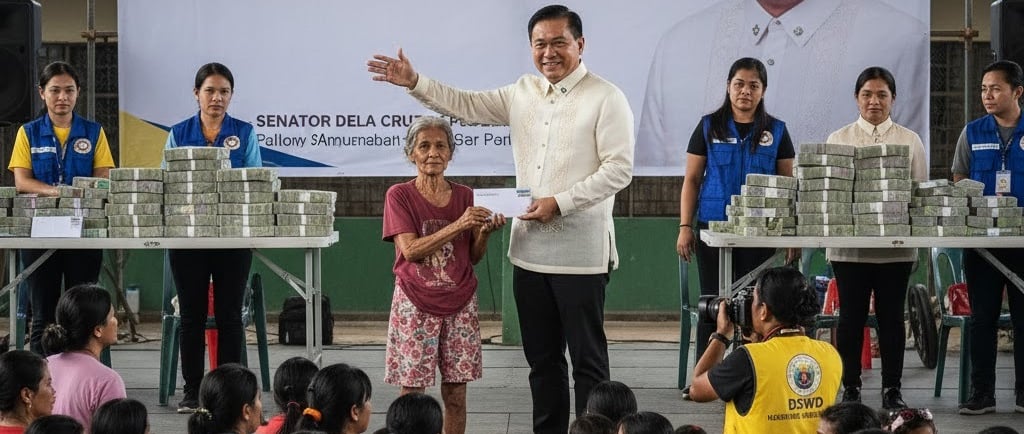DSWD's 4Ps, A Battle for the Filipino Soul
The Silver Coin and the Shadow of Power
THE EDITORIAL CHEESE
Patrick Petinglay Villavert
11/17/20253 min read


The Pantawid Pamilyang Pilipino Program (4Ps), managed by the Department of Social Welfare and Development (DSWD), is not just a government program; it is the nation's most solemn vow to its poorest citizens. Institutionalized by Republic Act No. 11310, it is a human capital investment strategy designed to shatter the intergenerational cycle of poverty, offering a conditional cash lifeline that demands something more profound than mere gratitude: compliance.
This is a program that trades hard cash for a commitment to a better future, compelling the destitute to invest in the health and education of their children. It is a desperate fight waged with every peso.
The Criteria of Desperation (Eligibility and Selection)
The privilege to be a 4Ps beneficiary is reserved for those identified in the deepest trenches of poverty. Selection is based on the Standardized Targeting System (Listahanan), a data-driven method designed to be objective and bypass political influence.
To qualify for this critical, multi-year support, a household must meet devastatingly simple criteria:
Poverty Status: They must be classified as poor or near-poor based on the national system.
Family Composition: They must have children aged 0-18 years old and/or a pregnant woman at the time of registration.
The application process is one of stoic waiting: selection is done through the systematic identification of the poorest families by DSWD personnel, not through public applications or endorsement by officials. The process aims to be purely technical, ensuring the scarce resources go only to those verified as needing them most.
The Burdened Grants: A Condition for Survival
The financial assistance is not a reward for being poor, but a payment for a strict adherence to conditions—a mandatory investment in human development. Failure to comply leads to the termination of the grant.
The core cash grants are distributed every two months and consist of the following:
Health Grant: A fixed amount of PHP750.00 per household per month (or PHP9,000.00 annually), contingent on pregnant women availing of pre- and post-natal care, and children aged 0-5 receiving regular check-ups and vaccinations.
Rice Subsidy: An additional PHP600.00 per month per household (or PHP7,200.00 annually) to cushion against rising food prices.
Education Grant: Provided for a maximum of three children per household, for ten (10) months a year:
Children in Daycare/Elementary: PHP300.00 per month.
Children in Junior High School: PHP500.00 per month.
Children in Senior High School: PHP700.00 per month.
The total annual maximum grant for a household with three children in Senior High School could reach up to PHP38,700.00—a monumental sum for an indigent family, yet one that barely covers the necessities required for education and health compliance in today's economy.
The Unforgivable Sin: When Public Funds Become Political Spectacle
The moment the 4Ps funds are physically distributed—often through local pay-outs or in large gatherings—a profound betrayal occurs. These distribution events are not mere administrative tasks; they are sacred moments where the government fulfills its core duty to the vulnerable.
But the scene is too often polluted by the conspicuous presence of a politician—a Governor, Mayor, or local councilor—standing front and center, handing out the cash-laden envelopes. This act is a dramatic and unacceptable appropriation of public funds for private political gain, a stain on the program’s noble mandate.
The Erosion of Dignity and Right
The politician, basking in the glow of the flashbulbs, aims to send a single, insidious message:
The Lie of Generosity: They create the poisonous illusion that the PHP750.00 Health Grant and the children's PHP700.00 Education Grant are gifts from their benevolence, rather than a non-negotiable right guaranteed by a law funded by the nation's taxpayers.
The Debt of the Poor: By associating the money with their face and name—often plastered on banners and backdrops—they weaponize the aid, transforming the beneficiary's feeling of relief into a sense of political indebtedness. The needy family is subtly coerced into feeling they owe their survival to the politician, rather than the commitment they themselves fulfill.
The Death of Neutrality: The 4Ps is a national, non-partisan anti-poverty program. Its integrity hinges on its political neutrality. When a political figure inserts themselves into the delivery mechanism, they degrade the program into a vehicle for electioneering, corrupting the very purpose of social development. The DSWD mandates strictly forbid the use of any program for partisan activity, yet the line is blurred, and the poor are left to wonder if their lifeline depends on a vote.
This spectacle is an unforgivable transgression against the dignity of the poor. It is a moment of vulnerability exploited for power, turning a public service into a personal advertisement. The money belongs to the Filipino people; it must be delivered with the sterile efficiency of a state fulfilling its promise, free from the shadow and the self-serving smile of the politician. The survival of a generation should never be a political platform.
